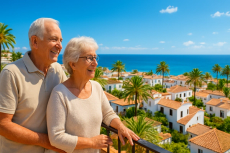Blog • Published on:October 9, 2025 | Updated on:October 9, 2025 • 18 Min
Your Complete Guide to Caribbean Island Life in 2025
Every island in the Caribbean sways to its own rhythm, some move to the beat of trade and tourism, others go with the flow, emphasizing community and calm.
Together they form a region where modern infrastructure, transparent taxation, and investor-friendly policies juxtaposes a way of life shaped by sunlight and sea.
For many expats, investors, and families, this region has become a second home. Strong economies, stable governments, and well-established CBI programs create options for people who value both lifestyle and strategy.
In this guide, you’ll find what makes Caribbean living different, from real costs and healthcare standards to the best islands for residency and long-term settlement.
Why Choose Living in the Caribbean
Relocating to the Caribbean appeals to people who want freedom, security, and a strong foundation for global living. The islands combine open economies with calm environments and clear legal frameworks for foreign residents.
Lifestyle and Environment
The Caribbean’s climate stays consistently warm throughout the year, averaging 27°C, with steady ocean winds that keep even humid months comfortable.
Beyond beaches, the islands have developed solid infrastructure, reliable energy grids, high-speed internet, and international schools, making relocation easy for professionals and families.
On islands such as Antigua and Barbuda, residents enjoy a mix of outdoor living and cultural life.
Local food markets, sailing events, and small art communities create a sense of belonging that’s both local and international.
For a closer look at daily life there, see our guide on safety and living in Antigua.
Tax and Residency Advantages
Caribbean governments have built legal systems that encourage foreign investment.
- No capital gains or inheritance tax in most jurisdictions
- No tax on worldwide income for residents and citizens in key islands like Saint Kitts and Dominica
- Structured investment residency routes, allowing applicants to gain citizenship within a few months through government-approved programs
These frameworks attract entrepreneurs and retirees who want predictable taxation and straightforward compliance.
Expat Communities and Global Access
Cities like St. George’s in Grenada and Castries in Saint Lucia have become established bases for remote professionals and business owners.
Direct flights connect the region to London, Toronto, and Miami, while local governments maintain strong relationships with the EU and the Commonwealth.
Many expats also choose to obtain dual citizenship through one of the official programs, gaining visa-free access to Europe, Singapore, and Hong Kong, a practical advantage for investors and families who travel frequently.
Top Caribbean Islands for Expats
The Caribbean’s islands differ widely in scale, economy, and culture, which is what makes the region so adaptable to different lifestyles.
Some islands appeal to investors looking for strong returns, others to families or retirees seeking permanence and calm.
Saint Kitts and Nevis Lifestyle
Saint Kitts and Nevis balances exclusivity with accessibility.
The dual-island federation is known for its strong legal system, good governance, and one of the most respected citizenship-by-investment programs in the world.
- English is the official language, and the Eastern Caribbean Dollar (XCD) remains stable, pegged to the US dollar.
- Daily life is relaxed but structured, from high-end resorts and private schools to efficient banking and low bureaucracy.
- Citizenship can be obtained through an approved investment, offering visa-free travel to over 150 countries.
For investors considering permanent relocation or dual citizenship, the Saint Kitts and Nevis Citizenship Program remains the region’s benchmark.
Antigua and Barbuda Living
Antigua and Barbuda blends a social, open culture with reliable infrastructure and business-friendly policies.
- The islands boast 365 beaches, strong air links to North America and Europe, and well-developed expat communities.
- The government’s citizenship-by-investment program is one of the most efficient for family applications, including dependent parents and unmarried siblings.
- The real estate market is active and regulated, with options ranging from marina residences to hillside villas.
To better understand the island’s environment and safety standards, you can explore our guide on living safely in Antigua.
Life in Dominica
Dominica, known as “The Nature Island,” is one of the most environmentally protected and affordable places to live in the Caribbean.
- The island combines dense rainforests and geothermal springs with a reputation for stability and resilience.
- Healthcare and education are publicly supported, and broadband infrastructure has improved considerably in recent years.
- Through its long-running investment program, citizenship can be obtained via donation or real estate purchase, with streamlined procedures.
Find practical details on everyday life in our Dominica relocation guide.
Grenada’s Appeal
Grenada offers a distinct mix of calm community life and global access.
- The island has one of the strongest passports in the region, with visa-free entry to China and Schengen countries.
- It attracts professionals in education, tourism, and healthcare, as well as investors through its citizenship-by-investment initiative.
- Life here is steady, with excellent marinas, low crime rates, and a focus on sustainable growth.
You can learn more about relocation and property options in our feature on living in Grenada.
Saint Lucia Experience
Saint Lucia blends economic opportunity with lifestyle value.
- It offers a wide range of residential options, from Castries’ city rhythm to Soufrière’s scenic coastlines.
- English is the official language, healthcare is of high quality, and direct flights connect the island to Europe and North America.
- The citizenship-by-investment program is structured, transparent, and known for fast processing.
Our in-depth Saint Lucia expat guide explores what makes the island an increasingly popular long-term base for professionals and families.
Caribbean Citizenship by Investment Programs
The Caribbean remains one of the most trusted regions in the world for citizenship-by-investment (CBI).
These programs allow qualified investors to obtain full citizenship and a passport within a few months, offering freedom of movement, family security, and long-term tax efficiency.
Investment Options Available
Each program provides different routes to citizenship, through donations, real estate, or business contributions.
- Saint Kitts and Nevis: The longest-standing program globally, offering citizenship through a $250,000 contribution to the Sustainable Island State Contribution (SISC) fund or a $325,000 real estate investment held for seven years.
- Antigua and Barbuda: Minimum investment of $230,000 to the National Development Fund, with options for real estate or university contributions for larger families.
- Dominica: Citizenship through a $200,000 real estate purchase or donation to the Economic Diversification Fund.
- Grenada: Citizenship via a $270,000 real estate investment or a $235,000 contribution to the National Transformation Fund.
- Saint Lucia: Investment options include a $240,000 donation to the National Economic Fund or $300,000 in government-approved property.
Benefits of Caribbean Citizenship
Holding citizenship in a Caribbean nation grants powerful global and regional advantages:
- Visa-free, visa-on-arrival, and eVisa access to over 140 destinations, including the UK, EU Schengen states, Singapore, and Hong Kong.
- Tax residency benefits under territorial systems that exclude global income, capital gains, and inheritance taxes.
- Full family inclusion, with rights extended to spouses, children, and in most cases, parents and siblings.
- Dual citizenship recognition, allowing applicants to retain their original nationality.
- Access to regional travel and investment frameworks under CARICOM and the Organisation of Eastern Caribbean States (OECS).
Processing Times and Requirements
Most programs finalize applications in six to eight months, depending on due diligence timelines and investment type.
- Applicants undergo comprehensive background checks through independent agencies.
- No residency or language requirement is imposed before or after approval.
- Citizenship is granted for life.
Family Inclusion Benefits
The Caribbean’s citizenship programs are known for their inclusive policies.
- Dependent children up to age 30 (and in some cases older) can be included.
- Parents and grandparents over 55 are eligible under specific conditions.
- In Antigua and Barbuda, unmarried siblings can also be added to the same application.
These family-centered structures make Caribbean programs among the most practical for global investors seeking multi-generational security.
Legal Requirements for Caribbean Residency
Foreign nationals moving to the Caribbean have several legal pathways to reside in the region, ranging from temporary residence and work permits to full citizenship –by investment.
Each island manages its own immigration framework, but the process across most jurisdictions is efficient and transparent.
Visa Requirements
Nationals from the US, UK, EU, and Canada can typically enter and stay visa-free for up to 90 days. Longer stays require a residency permit, which can be renewed annually.
Applicants must provide proof of income, a local address, and medical insurance. Some islands like Antigua and Barbuda also offer digital nomad visas valid for one to two years, ideal for remote professionals.
Residency Permits
Long-term residency is often granted after one to five years of lawful stay. Many expats obtain residency through:
- Employment sponsorships with local businesses
- Property ownership above set value thresholds
- Investment-based programs, which can directly lead to citizenship
Residency holders enjoy local healthcare access, banking rights, and the ability to purchase property without restrictions.
Regional Free Movement Agreement
As of October 1, 2025, Dominica, Barbados, Belize, and Saint Vincent and the Grenadines have officially introduced unrestricted free movement for their citizens.
This groundbreaking framework allows nationals to live, work, and reside indefinitely across these four nations without visas or work permits.
Participants receive automatic stay authorization upon arrival, with access to public healthcare, education, and social services under unified CARICOM protocols.
The agreement operates under CARICOM’s Enhanced Cooperation Protocol, representing the first step toward deeper regional integration beyond the traditional skills-based system.
For expats or investors who acquire citizenship in one of these countries, such as through the Dominica Citizenship by Investment Program,this free-movement framework adds significant long-term value, expanding residence and mobility options across the Eastern Caribbean.
Property Ownership Rules
Foreign buyers can freely purchase property in most Caribbean nations.
Some jurisdictions, such as Saint Kitts and Nevis, require an Alien Landholding License (ALHL) for non-citizens, while those who acquire citizenship are exempt.
All transactions are registered through the Land Registry, ensuring clear title and legal protection for foreign investors.
Banking Regulations
The region has a modern and well-regulated financial system.
Opening a local account typically requires:
- Passport or citizenship certificate
- Proof of address
- Source of income or funds declaration
Saint Lucia and Grenada have established international banking centers offering multi-currency accounts, while Antigua and Barbuda provides digital banking access for global transactions.
Healthcare in the Caribbean
The Caribbean’s healthcare landscape varies from island to island but continues to expand rapidly with regional investment and public–private partnerships.
Most nations provide accessible public healthcare complemented by well-equipped private clinics that cater to residents and expatriates.
Public Healthcare Systems
Every major Caribbean nation maintains a public health service that offers affordable or free primary care for residents and citizens.
- Dominica and Grenada operate national systems that cover basic medical consultations, emergency services, and maternity care.
- Saint Lucia and Antigua have modernized hospitals and clinics supported by regional funding and training programs.
- Smaller islands cooperate under CARICOM to share specialist services and medical resources across borders.
Public hospitals are reliable for general needs, though waiting times may be longer in smaller islands.
Private Medical Facilities
Private healthcare is expanding across the Caribbean, especially in Barbados, Saint Lucia, and Grenada, where clinics meet international standards.
- Private hospitals offer full diagnostics, surgical care, and advanced treatments.
- Internationally accredited doctors and visiting specialists support high-quality service delivery.
- Many expats prefer private clinics for shorter waiting times and broader coverage.
The region’s growing medical infrastructure has made it a practical choice for retirees and long-term residents.
Health Insurance Requirements
Health insurance is mandatory for most residency and citizenship applicants.
- Basic plans cost around $100–$250 per month, covering consultations, prescriptions, and minor procedures.
- Comprehensive international coverage can range between $300–$500, depending on age and health condition.
- Insurance is also a prerequisite for digital nomad and investor residency permits in most islands.
Applicants are encouraged to maintain coverage that includes air evacuation, as serious cases may require treatment in larger regional centers or the US.
Medical Tourism Options
Several islands have positioned themselves as medical tourism destinations.
- Barbados and Saint Lucia are known for cosmetic and elective procedures performed by internationally trained professionals.
- Grenada and Dominica are developing wellness tourism, combining healthcare with natural therapies, spas, and retreat programs.
These initiatives complement the region’s residency frameworks, making healthcare both accessible and a source of economic growth.
Business and Investment Opportunities
The Caribbean’s economies are driven by more than tourism.
Strategic investment laws, regional trade access, and favorable tax frameworks make the islands an attractive base for global entrepreneurs, family offices, and location-independent professionals.
Tax Benefits and Incentives
Most Caribbean jurisdictions operate territorial tax systems, taxing only local income while exempting foreign earnings.
- No tax on worldwide income, inheritance, or capital gains in nations such as Saint Kitts and Nevis, Antigua and Barbuda, and Dominica.
- Tax holidays and duty exemptions for approved investments in tourism, agriculture, and manufacturing.
- Special Economic Zones (SEZs) in Grenada and Saint Lucia offer reduced corporate taxes and simplified import procedures.
These frameworks allow investors to legally structure assets and operations with predictable, transparent obligations.
Economic Citizenship Programs
The Caribbean remains the global leader in citizenship –by investment (CBI), a model that directly channels foreign capital into national development.
Each approved program operates under government oversight with internationally recognized due diligence.
- CBI contributions fund renewable energy, infrastructure, education, and healthcare.
- Investors receive lifetime citizenship and full residency rights.
For HNWIs, CBI is both a mobility and asset-protection tool.
You can explore the specific structures in detail through our guides to Grenada’s program and Dominica’s program.
Business Setup Process
Establishing a company in most Caribbean jurisdictions is efficient and fully open to foreign ownership.
- Business registration typically takes five to ten working days.
- Requirements include incorporation documents, shareholder details, and a registered local address.
- Corporate bank accounts can be opened within two weeks, depending on due diligence procedures.
Professional and financial services, law firms, accountants, and compliance specialists, are widely available across Saint Kitts, Antigua, and Barbados, ensuring international standards are met.
Investment Sectors
While tourism remains central, new industries are emerging across the region:
- Renewable energy: Solar and wind projects in Barbados and Saint Lucia are attracting sustainable investors.
- Education and medical services: Grenada’s St. George’s University anchors a growing education economy.
- Real estate development: Waterfront and eco-friendly resorts continue to draw international demand.
- Agriculture and agro-processing: Dominica’s organic farming and export programs create viable opportunities for sustainable investors.
The combination of low taxes, stable governance, and expanding global connections continues to make the Caribbean a solid base for long-term ventures.
Lifestyle and Culture
The Caribbean lifestyle is shaped by community, rhythm, and balance.
Each island has its own pace, from Antigua’s colorful festivals to Grenada’s rolling hills, yet all share a sense of warmth and local connection that makes daily life both easy and meaningful.
Caribbean Climate and Weather
The climate across the region is consistently tropical, with temperatures averaging 27°C throughout the year.
- The dry season runs from December to April, offering clear skies and steady breezes.
- The wet season, between May and November, brings brief showers that keep the landscape lush and fertile.
Hurricane preparedness is part of island life, but infrastructure and alert systems have improved greatly in recent years.
Islands such as Barbados and Grenada sit outside the main hurricane belt, offering greater year-round stability.
Local Customs and Traditions
Cultural life in the Caribbean reflects centuries of influence, African, European, Asian, and Indigenous.
- Traditional music genres such as calypso, soca, and reggae define regional identity.
- Annual events like Carnival in Saint Lucia or Independence celebrations in Dominica bring communities together across generations.
- Cuisine remains central to daily life, with ingredients like coconut, plantain, and fresh seafood forming the base of most local dishes.
These shared customs make integration easy for newcomers while keeping cultural authenticity at the center of social life.
Social Integration
Expats and locals often connect through neighborhood associations, sailing clubs, or business chambers.
- Saint Kitts, Grenada, and Antigua have active international communities that help new residents settle quickly.
- The welcoming nature of Caribbean societies makes it easy to build personal and professional networks without formal barriers.
English is widely spoken across most islands, and local dialects blend regional and historical influences, giving every island its unique tone and charm.
Entertainment and Recreation
Life in the Caribbean naturally revolves around outdoor activities and community events.
- Sailing, diving, and hiking are part of everyday leisure.
- Cultural nights, jazz festivals, and beachside dining add rhythm to the week.
- Modern sports facilities and wellness centers have expanded in Saint Lucia and Barbados, encouraging balanced, active lifestyles.
Evenings are unhurried, the kind of slow social rhythm that defines the region’s appeal for both locals and expatriates.
Practical Aspects of Caribbean Living
Relocating to the Caribbean is as much about practical planning as it is about lifestyle.
The region has steadily modernized its infrastructure and services, creating a comfortable environment for long-term living.
Transportation Options
Transportation is straightforward and affordable across most islands.
- Public transport: Mini-buses and shared taxis operate on fixed routes, costing around $1–$2 per ride.
- Private vehicles: Most expats choose to rent or buy a car. A compact vehicle costs between $12,000–$20,000, with gasoline averaging $1.40 per litre.
- Ferries and inter-island flights: Regional carriers such as LIAT and Caribbean Airlines connect major islands, while ferries link nearby destinations like Antigua–Barbuda and Saint Lucia–Martinique.
Road conditions are generally good, especially in Barbados, Antigua, and Saint Kitts, though driving is often on the left side in former British territories.
Communication Services
Internet coverage is stable and continually improving.
- Broadband packages average $60–$100 per month for high-speed connections.
- Mobile coverage is reliable, with providers such as Flow and Digicel operating across the region.
- Most islands offer eSIM support and digital banking, allowing residents to manage personal and business affairs online.
Remote work has become increasingly common, supported by government-backed digital nomad visas in countries like Barbados and Antigua and Barbuda.
Safety and Security
The Caribbean is widely considered a safe region for residents and investors.
- Crime rates in islands such as Grenada, Antigua, and Saint Kitts remain among the lowest in the Western Hemisphere.
- Most communities maintain close social ties and active neighborhood watch programs.
- Emergency services, including coast guards and disaster-response systems, have been upgraded with regional support from CARICOM IMPACS.
For those seeking a calm, community-oriented lifestyle, the Caribbean offers an ideal balance of privacy and security.
For island-specific insights, see Is Antigua Safe? Safety Guide for Residents and Visitors.
Educational Facilities
Education standards vary but continue to rise with government investment.
- Public schooling is available and often free for residents.
- Private and international schools follow British, American, or IB curricula, particularly in Saint Kitts, Antigua, and Barbados.
- Annual tuition for international schools typically ranges between $6,000–$12,000.
Universities in Grenada (such as St. George’s University) and Barbados attract students globally, contributing to the region’s educated, international environment.
Steps to Relocate to the Caribbean
Relocating to the Caribbean requires clear planning, from choosing the right island to arranging legal, financial, and logistical details.
The process is straightforward when approached with the right preparation.
Planning Your Move
The first step is selecting the island that aligns with your goals.
- For lifestyle and community: Antigua and Saint Kitts combine comfort with developed expat networks.
- For nature and peace: Dominica and Grenada stand out for their environment and stability.
- For convenience and flight access: Saint Lucia and Barbados offer strong connectivity to North America and Europe.
It’s best to visit your shortlisted destinations before finalizing your choice, this helps gauge culture, cost of living, and practical aspects like healthcare and schooling.
Documentation Required
The main documents needed for long-term relocation include:
- Valid passport and birth certificate
- Proof of income or investment
- Health insurance policy
- Police clearance certificate
- Rental or property agreement
- Medical certificate (in some cases)
Applicants pursuing citizenship or residency by investment should also include bank statements and source-of-funds documentation. Each island’s immigration office provides specific checklists.
Finding Accommodation
Most new residents begin with a rental before purchasing property.
- Short-term rentals: $800–$1,500 per month for furnished apartments in coastal areas
- Long-term leases: Often available for one to three years with flexible terms
- Buying property: Straightforward for foreigners, and even more advantageous for those holding Caribbean citizenship
Property investment can also qualify for citizenship-by-investment in countries like Antigua and Barbuda, Grenada, and Saint Kitts and Nevis.
Setting Up Essential Services
Upon arrival, most expats set up their utilities and accounts within a few days:
- Electricity and water: Managed by local utility companies; billing can be automated online.
- Bank accounts: Opened within one to two weeks with valid identification and proof of residence.
- Internet and mobile: Providers offer quick setup, often within 24 hours.
Some islands, such as Saint Lucia and Grenada, have online government portals that streamline utility connections and business registrations, saving time and paperwork.
Living the Caribbean Way
Life in the Caribbean isn’t a pause from reality, it’s a new version of it.
Choosing the Caribbean means choosing a place that values balance. Whether you’re building a business, retiring, or simply looking for a new base for your family, the region offers rare alignment between personal freedom and economic opportunity.
If your goal is to live, invest, or gain second citizenship in the Caribbean, Savory & Partners can guide your next step.
FAQs on Living in the Caribbean
How can I live permanently in the Caribbean?
You can gain permanent residence through long-stay visas, residency permits, or citizenship-by-investment programs offered by islands such as Saint Kitts and Nevis, Antigua and Barbuda, Grenada, Dominica, and Saint Lucia. These programs provide full residency rights, including the ability to live and work indefinitely.
Which Caribbean island has the lowest cost of living?
Dominica and Grenada are known for affordable living standards. Local produce, moderate housing prices, and low taxation make them attractive for expats and retirees.
Can I buy property in the Caribbean as a foreigner?
Yes. Foreign buyers can purchase real estate in most Caribbean nations without restrictions. In some countries, such as Saint Kitts and Grenada, property purchases can qualify you for citizenship.
How safe is life in the Caribbean?
Islands like Antigua, Saint Kitts, and Grenada maintain some of the region’s lowest crime rates. Most communities are small and closely connected, contributing to strong public safety and community trust.
What are the tax benefits of Caribbean citizenship?
Caribbean countries with citizenship programs generally offer no tax on worldwide income, capital gains, or inheritance. This makes them ideal for entrepreneurs, investors, and retirees seeking efficient, transparent fiscal systems.
References
Government of Saint Kitts and Nevis. (n.d.). Citizenship by Investment Unit – Official Information Portal. Retrieved from https://www.ciu.gov.kn
Government of Antigua and Barbuda. (n.d.). Citizenship by Investment Program (CIP Unit). Retrieved from https://cip.gov.ag
Government of Saint Lucia. (n.d.). Citizenship by Investment Programme – Official Government Portal. Retrieved from https://www.cipsaintlucia.com
Government of the Commonwealth of Dominica. (n.d.). Citizenship by Investment Unit – Official Website. Retrieved from https://cbiu.gov.dm
Government of Grenada. (n.d.). Citizenship by Investment Programme. Retrieved from https://imagrenada.gd/
CARICOM Secretariat. (2025). Enhanced Cooperation Protocol on Freedom of Movement for Dominica, Barbados, Belize, and Saint Vincent and the Grenadines. Retrieved from https://caricom.org
Organisation of Eastern Caribbean States (OECS). (n.d.). Economic Integration and Free Movement Framework. Retrieved from https://www.oecs.org
Written By

Laura Weber
Laura Weber is a legal expert in international tax planning and citizenship by investment. With over a decade of experience, Laura helps individuals and families navigate complex legal frameworks to secure dual citizenship and global residency options, particularly in the Caribbean and Europe.
Related Articles









Recently Published









Book a free consultation


